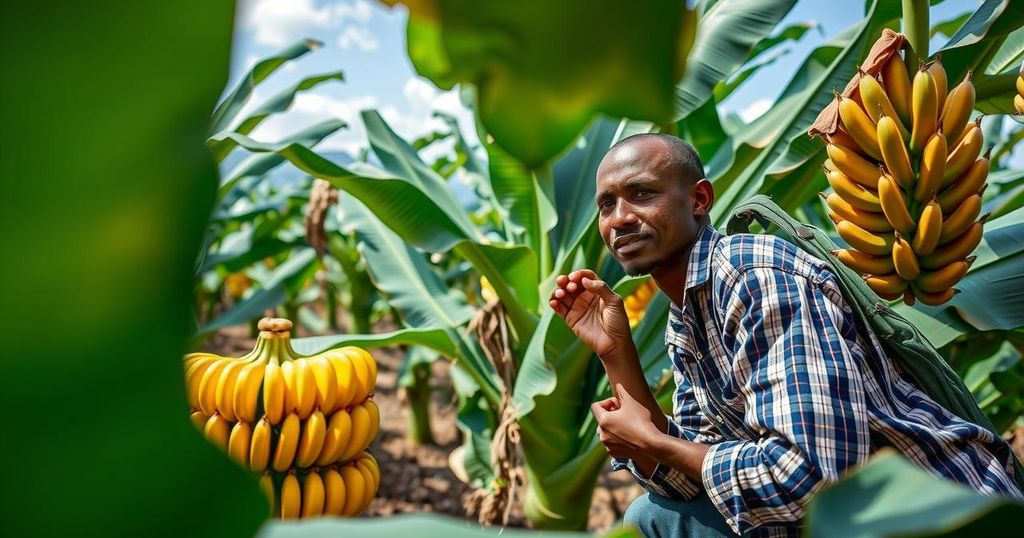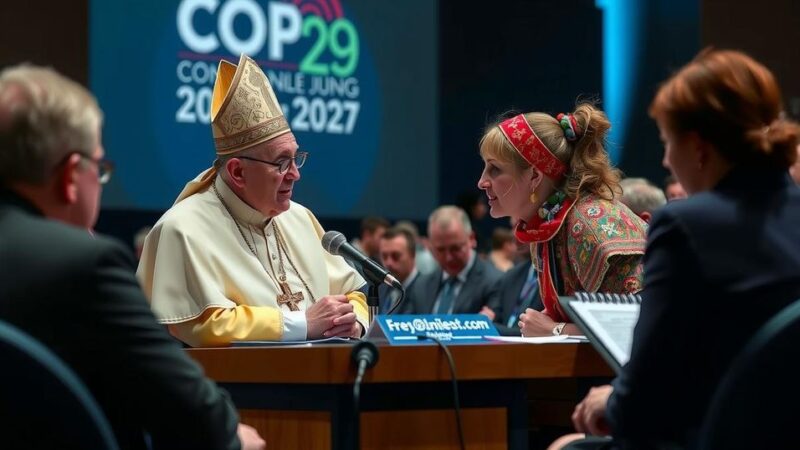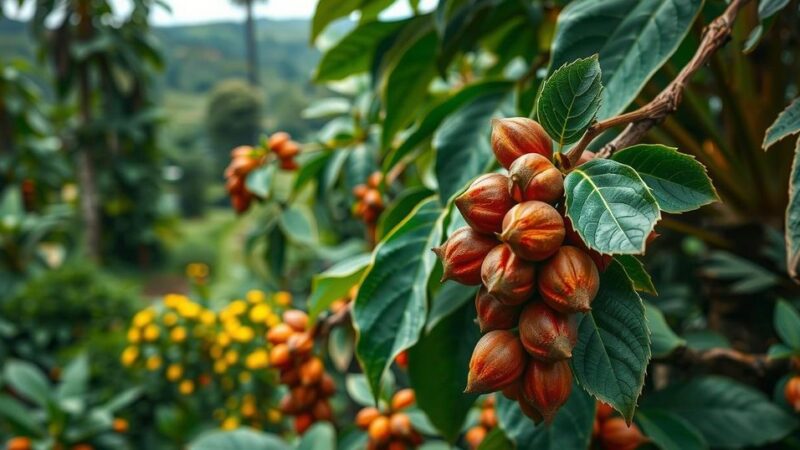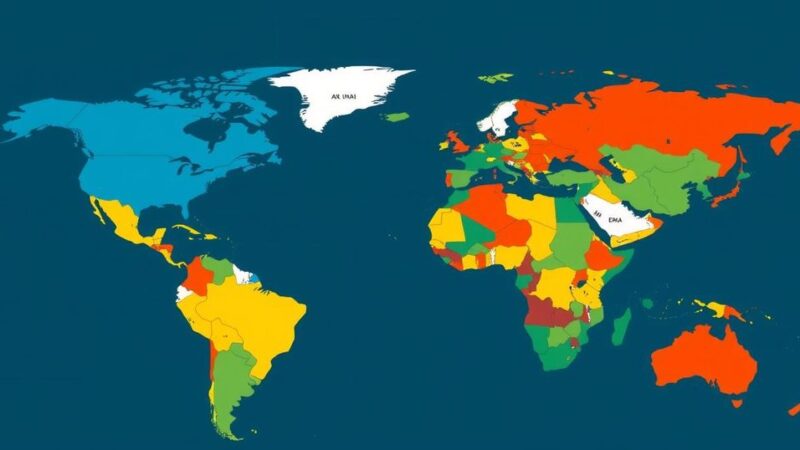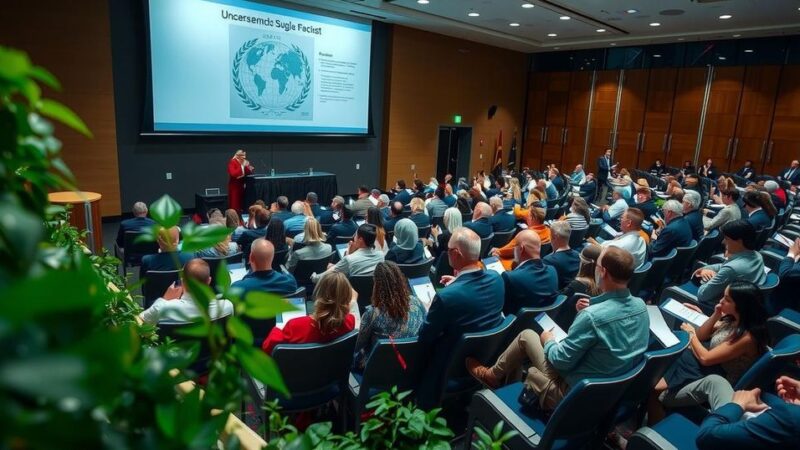The NDC Action Project, a collaboration between UNEP and the UNEP Copenhagen Climate Centre, aims to support Ugandan banana farmers facing severe climate impacts through innovative crop insurance linked to technology. The initiative trains farmers, especially women, in using smartphones to document crop conditions, facilitating quick insurance assessments and payouts without extensive inspections. This project enhances resilience against climate change while promoting financial stability, with plans to expand from 5,000 to 50,000 farmers, ultimately benefitting the national agricultural landscape.
Ahumwire Justine, a banana farmer from Shuku in southwest Uganda, faced a harsh reality last October when a severe rain and hailstorm devastated her plantation, destroying 300 banana trees and claiming the lives of two of her cows. The storm inflicted significant financial distress, leading Justine and her family to contemplate abandoning their unprotected two-hectare plot. “We had no food, no money for school fees for my children, and no food for my animals,” she recounts, highlighting the precarious situation many farmers find themselves in as climate change intensifies weather extremes. To address this vulnerability, the NDC Action Project, a collaborative initiative by the United Nations Environment Programme (UNEP) and the UNEP Copenhagen Climate Centre (UNEP-CCC), seeks to implement financial protections for farmers like Justine against the growing threat of extreme weather events. Mirey Atallah, Chief of the Adaptation and Resilience Branch within UNEP’s Climate Change Division, remarked, “We know farmers, particularly smallholders, are struggling to adapt to the effects of the climate crisis. That is why projects that combine technical and financial instruments such as these are so important. They increase resilience and ensure that extreme weather does not have to be catastrophic for farmers.” Bananas are vital to Uganda’s economy; as of 2019, nearly 47 percent of farmers were engaged in banana cultivation. Beyond being a staple food crop, banana plants provide materials such as fibers for ropes and mats, and leaves for mulching and packaging. However, the unpredictable nature of climate over the past 15 years poses significant challenges. Florence Muranga, Director of the Banana Industrial Research and Development Centre, noted, “We could have two years of non-stop rain, and then six months with no rain at all. [Farmers] can lose their food, their livelihood, their house in one day.” The Banana Industrial Research and Development Centre represents approximately 5,000 banana farmers and plays a crucial role in UNEP’s initiative to increase access to crop insurance. The organization has trained an initial cohort of 930 banana farmers in technology use, allowing them to upload images of their crops to a digital platform. Following adverse weather events, farmers can report damage by sharing photos, enabling agroeconomists from partnered insurance firms to assess losses swiftly. Notably, nearly half of the participating farmers are women. “Champion farmers,” such as Justine, have been trained to mentor other smallholders in using smartphones. In collaboration with Agriculture and Climate Risk Enterprise Africa, the insurance is facilitated through Agro Consortium Limited, a coalition of private and public insurance providers. The digital nature of the insurance process minimizes the need for in-person assessments, thereby expediting claim payouts and reducing premiums. Additionally, farmers receive training in water management and agroforestry, enhancing productivity and decreasing potential climate-induced losses. This approach not only supports farmers but also reassures financial institutions regarding loan provisioning. The pilot project has yielded promising results, prompting plans to extend the scheme to encompass all 5,000 farmers represented by the Banana Industrial Research and Development Centre, with ambitions to include up to 50,000 farmers nationwide. For Justine, the insurance initiative offers invaluable peace of mind. “I know that if [my crops get damaged] I have help. It is not like in other years, where I would have to start from zero.” UNEP is committed to facilitating the objectives of the Paris Agreement, striving to limit global temperature rise to well below 2°C, ideally to 1.5°C compared to pre-industrial levels. A roadmap titled the Sectoral Solution has been crafted by UNEP to guide emission reductions across various sectors, including agriculture and food, aligning efforts with the commitments of the Paris Agreement and striving for climate stability.
The increasing frequency and intensity of storms as a consequence of climate change have made agriculture, particularly in regions like Uganda, increasingly precarious. Farmers, especially those growing staple crops like bananas, face significant financial losses due to unpredictable weather patterns that result in droughts or excessive rainfall. Initiatives such as the NDC Action Project are crucial in providing farmers with innovative insurance mechanisms designed to protect their livelihoods and promote resilience amidst the ongoing impacts of climate change. With bananas being a cornerstone of Uganda’s agricultural sector, efforts to stabilize farmers’ income through insurance are vital for both economic fortitude and food security in the country.
In conclusion, the initiative spearheaded by UNEP and its partners represents a significant advancement in protecting Uganda’s banana farmers against the adverse impacts of climate change. By integrating technology with financial instruments, the project not only safeguards the livelihoods of farmers like Ahumwire Justine but also fosters resilience within the agricultural sector. As climate variability continues to challenge traditional farming practices, such innovative solutions will be essential in ensuring sustainable agricultural development in Uganda.
Original Source: www.unep.org
